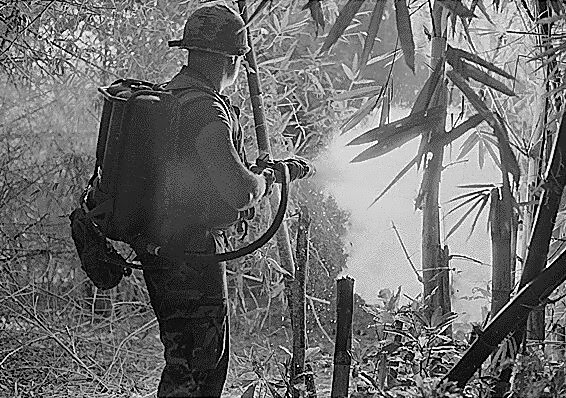Fiedler submitted his designs for a man-portable horrific weapon that spits goddamn fire at people to the German army in 1901, and he called it the Flammenwerfer. What with being German and all. It was first used in combat in World War I, where it was used to cleverly employ man's subtle fear of dying horribly in a fiery inferno, making soldiers run out into the open. That was not such a good thing to do in Trench Warfare.
 |
| They didn't call it "No Man's Land" because it was a ladies-only club. |
They were used much more extensively in World War II, where both the Axis and the Allies learned that throwing fire into a building was actually a really handy trick for murdering everything inside. The U.S. found them particularly useful in the Pacific Theater, where they could belch the white hot fury of Hades into caves and thick vegetation, burning down the later and sucking all the oxygen out of the former. The only drawback was a mild concern that the person carrying the weapon was essentially an incendiary bomb at all times.
 |
| Which I guess is a pretty big deal to some people |
As of 1978, the U.S. military stopped all use of flamethrowers in combat. It turns out they're not actually all that effective on the battlefield. At least, not effective enough to justify the public relations problem that results from causing horrific, burning, largely indiscriminate death. Not to worry, though! The flamethrower has more uses!
We'll start with the positive one. Remember how Smokey Bear was wrong about forest fires? Well, it turns out that the best way to do a controlled burn and prevent out-of-control wildfires involves flamethrowers. Neat, huh? It gets better!
 |
| Better than public works projects? Impossible! |
In the good old United States of America, flamethrowers are almost completely unregulated on a federal level! In many states, you can either purchase or build your own flamethrower and use it for whatever purpose you want! Other than killing folks. We do have laws for that. But if you think a flamethrower is necessary for your personal protection against home invaders, you are within your rights to have one under your pillow. Criminals will regret ever breaking into your house. And your house will probably burn to the ground.
But that's nothing compared to what I see as the pinnacle of flame propelling technology. In South Africa, starting in 1998, car-mounted flamethrowers were available as a defensive measure against car jacking. Someone trying to break into your car? No problem! Set them on fire!
 |
| I'm not seeing any way this could go horribly wrong. |
They've since discontinued that particular product line, so now South Africans have to settle for personal pocket flamethrowers for self defense. Which are available in stores. Over the counter.
Holy shit.














